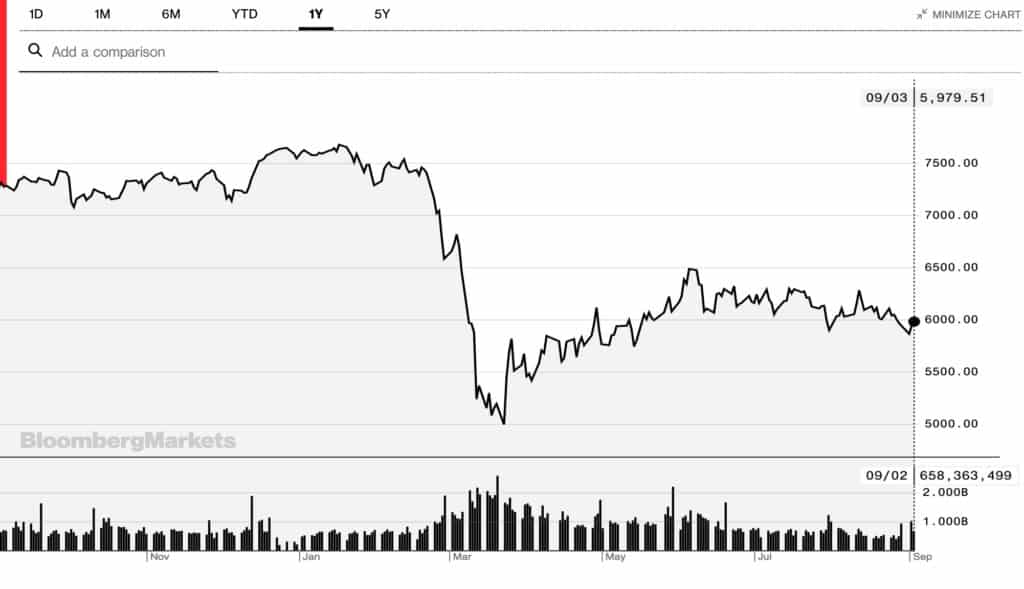The FTSE 100 Index is currently trading at multi-year lows, not for lack of enthusiasm among traders, but by dint of the devastating effects of the global pandemic.
The vaunted FTSE 100, a bastion of pride for Britons, has posted 1-year returns in the region of -19.50% (3 September 2020).
Compare this to the stellar performance of the S&P 500 index which is up 20.17% over 1 year, or the NASDAQ composite index which is up 46.34% over 1 year. The differences are striking to say the least, but trading opportunities still abound in British markets.

Source: FTSE 100 Index Bloomberg
Major UK Companies on the Brink
Stock market performance in the UK has been lacklustre to say the least. High levels of volatility, low confidence, and low growth prospects are the norm. However, there is still plenty of money to be made by correctly calling stocks vis-a-vis bullish and bearish signals. Presently, several industries are reeling from the pandemic notably travel and tourism, energy (oil, natural gas), and tech stocks. The BBC ran an op-ed by Robert Plummer, listing a host of industries currently under financial strain. These include additional industries in the form of road haulage companies, ferries, horticulture, steel, and the airlines.
Indeed, trading activity reflects bearish sentiment in these industries, as evidenced by the number of trading accountshort-options among leading European brokerages. Substantial profits stand to be gained when accurate forecasts are made, and leverage is used. The most heavily-traded industry, currency trading continues to favour the USD and JPY over the GBP, given the slowdown in UK economic performance, with peripheral Brexit-related concerns. Other heavily- traded markets include indices, metals, energy, and exotic currency pairs. In 2020, the GBP has posted sharp gains from March lows against the USD, and is hovering around the 1.3270 mark. A sustained appreciation bodes well for the bulls, but adds pressure on UK export markets
The Virgin Atlantic Case Study: High Court Approval
Notable UK companies, with operations headquartered in the US, such as Virgin Atlantic recently filed for Chapter 15 bankruptcy protection. The move certainly wasn’t a surprise to traders who had been shorting the stock for months. The UK court system approved a rescue plan for the beleaguered airline. 49% of Virgin Atlantic is owned by Delta Airlines. September 2020 was deemed crunch time for Virgin Atlantic, by CEO, Richard Branson. Such was the severity of the crisis that he even offered his private islands as collateral for a bailout. While prospects for Virgin Atlantic were grim, traders were happily shorting the stock for strong gains.
As good fortune would have it, Virgin Atlantic secured financial backing to the tune of £1.2 billion in a rescue package from its creditors. This lifeline will allow the company to continue operations well into the future (18 month projections), while saving upwards of 6,500 jobs. The High Court in London was the next stop on September 2, 2020. The terms of the deal will ensure that Virgin Atlantic will receive £400 million in cash, half of which will be delivered by the Virgin Group, under Sir Richard Branson. Multiple airline carriers around the world have suffered immeasurable damage, resulting in the shuttering of operations, with thousands of layoffs, and entire fleets being grounded. While this certainly presents as bad news for investors, it is a lucrative trading opportunity for going short on stocks.
IBIS World Report Offers Insights into High-Growth UK Companies
recently released an in-depth analysis of 440+ industries across the United Kingdom, and listed their revenue growth potential for 2020. The report [commissioned before the pandemic] said open-ended investment company activities in the UK were the fastest revenue growth drivers, followed close in tow by life insurance, immersive technology, and CRM systems providers. Other rapidly-growing industries in the United Kingdom currently include language learning software developers, healthcare, construction, and online ordering & delivery platforms across the UK.
High levels of trading activity are now par for the course with online business, education, medical, delivery, and other services. As such, online book retailers, peer-to-peer lending services, online delivery, telemedicine, remote conferencing, and other technological wunderkinds are recording high levels of growth, and investment. Traders looking to profit under current market conditions are strongly advised to plough £s into these new-age business models, particularly those with strong leadership and substantial startup capital in place.


